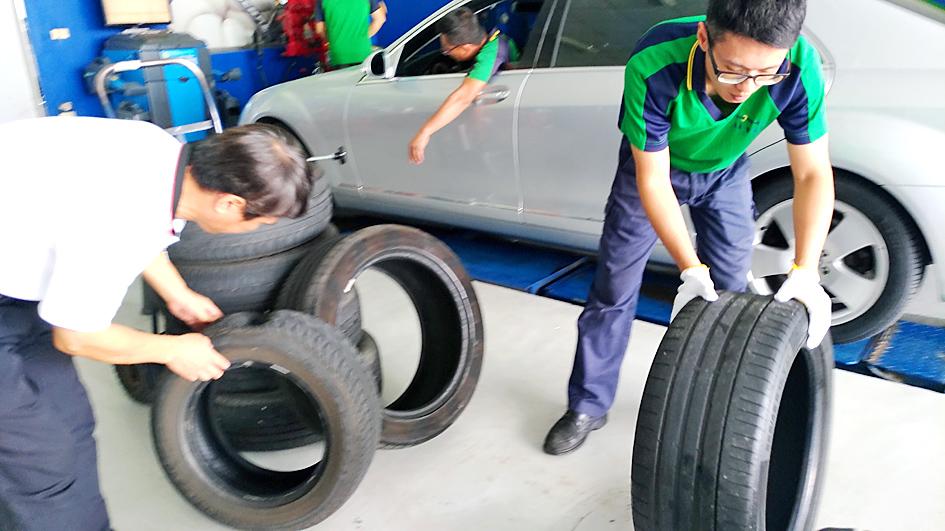Suppliers of automobile and truck tires from Taiwan and three other countries are facing anti-dumping tariffs after US authorities upheld a preliminary ruling accusing them of selling products at unfairly low prices in the US.
The decision by the US Department of Commerce released on Monday states that anti-dumping tariffs of 14.62 to 101.84 percent would be imposed on tire makers from Taiwan, South Korea, Thailand and Vietnam, with Taiwan facing the highest penalties.
Cheng Shin Rubber Industry Co (正新橡膠) and Nankang Rubber Tire Corp (南港輪胎), the two mandatory Taiwanese respondents, face anti-dumping tariffs of 20.04 percent and 101.84 percent respectively, while other Taiwanese exporters face an 84.75 percent penalty.

Photo: Liao Shu-ling, Taipei Times
The department would impose tariffs of 14.62 to 21.09 percent on tire exporters from Thailand, 14.72 percent to 27.05 percent on South Korean exporters, and zero to 22.27 percent on tire makers from Vietnam.
Another step is required before the anti-dumping tariffs can take effect. The US International Trade Commission (ITC) is also studying imports of tires from the four nations, and its commissioners are scheduled to conclude their investigation on June 23 and vote on whether to uphold the case.
The department is to forward its final results to the ITC for consideration. Some changes were made to the tariffs in the department’s final review.
Cheng Shin’s dumping duty was 52.42 percent after the preliminary review, but it was lowered by more than half to 20.04 percent, while Nankang Rubber’s penalty was raised to 101.84 percent, from 98.44 percent.
The tariffs for all other Taiwanese exporters fell slightly to 84.75 percent, from 88.82 percent.
The Taiwan Rubber & Elastomer Industries Association said that it was surprised by the latest ruling, as no Taiwanese tire makers intended to dump their products on US markets.
During the department’s investigation, Taiwanese respondents provided material to show they were not selling their products at unfair prices, but they still received the stiffest penalty, which could hurt Taiwan’s competitive edge, the association said.
The tariffs could prompt firms to relocate their production lines to other countries to avoid the tariffs, with workers in Taiwan bearing the brunt of the US measure, it said.
Nankang Rubber earlier said that it would ship passenger vehicle and light truck tires to the US from its Zhangjiagang plant in China’s Jiangsu Province instead of its production base in Hsinchu County’s Sinfeng Township (新豐).
However, tire products not affected by the ruling would still be shipped from the Sinfeng plant to the US, and production would be expanded, the company said.
Cheng Shin said that passenger vehicle and light truck tires account for less than 2 percent of its total sales.

TECH BOOST: New TSMC wafer fabs in Arizona are to dramatically improve US advanced chip production, a report by market research firm TrendForce said With Taiwan Semiconductor Manufacturing Co (TSMC, 台積電) pouring large funds into Arizona, the US is expected to see an improvement in its status to become the second-largest maker of advanced semiconductors in 2027, Taipei-based market researcher TrendForce Corp (集邦科技) said in a report last week. TrendForce estimates the US would account for a 21 percent share in the global advanced integrated circuit (IC) production market by 2027, sharply up from the current 9 percent, as TSMC is investing US$65 billion to build three wafer fabs in Arizona, the report said. TrendForce defined the advanced chipmaking processes as the 7-nanometer process or more

China’s Huawei Technologies Co (華為) plans to start mass-producing its most advanced artificial intelligence (AI) chip in the first quarter of next year, even as it struggles to make enough chips due to US restrictions, two people familiar with the matter said. The telecoms conglomerate has sent samples of the Ascend 910C — its newest chip, meant to rival those made by US chipmaker Nvidia Corp — to some technology firms and started taking orders, the sources told Reuters. The 910C is being made by top Chinese contract chipmaker Semiconductor Manufacturing International Corp (SMIC, 中芯) on its N+2 process, but a lack

NVIDIA PLATFORM: Hon Hai’s Mexican facility is to begin production early next year and a Taiwan site is to enter production next month, Nvidia wrote on its blog Hon Hai Precision Industry Co (鴻海精密), the world’s biggest electronics manufacturer, yesterday said it is expanding production capacity of artificial intelligence (AI) servers based on Nvidia Corp’s Blackwell chips in Taiwan, the US and Mexico to cope with rising demand. Hon Hai’s new AI-enabled factories are to use Nvidia’s Omnivores platform to create 3D digital twins to plan and simulate automated production lines at a factory in Hsinchu, the company said in a statement. Nvidia’s Omnivores platform is for developing industrial AI simulation applications and helps bring facilities online faster. Hon Hai’s Mexican facility is to begin production early next year and the

Who would not want a social media audience that grows without new content? During the three years she paused production of her short do-it-yourself (DIY) farmer’s lifestyle videos, Chinese vlogger Li Ziqi (李子柒), 34, has seen her YouTube subscribers increase to 20.2 million from about 14 million. While YouTube is banned in China, her fan base there — although not the size of YouTube’s MrBeast, who has 330 million subscribers — is close to 100 million across the country’s social media platforms Douyin (抖音), Sina Weibo (新浪微博) and Xiaohongshu (小紅書). When Li finally released new videos last week — ending what has